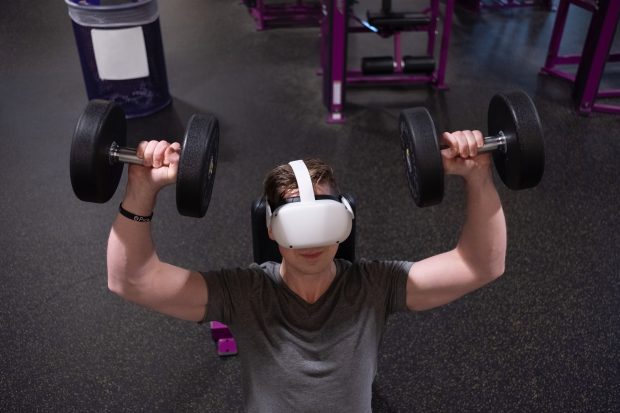In 2016, Japanese scientists from the University of Tokyo’s Cyber Interface Lab shared that they had invented diet goggles. These were intended to hack our senses in ways that “reduce appetite, make low-fat foods taste delicious, and trick our brains into thinking we’re eating more than we really are.” Dubbed “augmented satiety,” this VR system established itself as a possible way to fight obesity. This development raised the subsequent question: could VR help in fighting obesity?
What is Obesity?
Commonly defined as having excessive body mass, obesity is a long-term chronic disease that is encapsulated by abnormal levels of excessive body fat (also known as adipose tissue). While body fat itself is not a disease, having it in high amounts can change how your body functions. These changes occur progressively, and lead to adverse health effects.
While there is no single cause of obesity, the most common ones include:
- Food and lack of physical activity: Obesity can arise due to you consuming more calories than you burn through physical activity. If a diet is too high in calories but is lacking in fruit and vegetables, it can cause excessive weight gain.
- Genetics: Genes can contribute to one’s susceptibility to weight gain. However, it must be noted that they merely increase the risk caused by outside factors, such as abundant food supply, or lack of physical exercise.
- Medical Reasons: Underlying medical conditions, such as hypothyroidism, and Cushing’s syndrome, can contribute to weight gain.
- Stress and Emotional Factors: Some people eat more than usual when they are angry, upset, or stressed.
How Is It Determined?
Typically, this can be determined by measuring your body mass index (BMI). Your BMI is a measure of whether your weight is healthy for your height. However, other more accurate measures of your body fat and its distribution include blood tests, waist-to-hip comparisons, and screening tests.
Obesity is a global issue. According to the World Obesity Federation‘s 2023 atlas, it is predicted that within the next 12 years, 51% of the world, or more than 4 billion people will be obese or overweight. In the search for ways to fight this global epidemic, VR has been identified as a possible option.
What is VR?
Virtual reality is simply defined as a computer-generated environment that immerses the user in objects and scenes that appear to be real. Creating a simulated 3D environment enables users to explore and interact with a virtual environment in a way that is similar to reality.
This is achieved by fully immersing the users’ senses through the use of high-performance computers and sensory equipment such as headsets and position trackers. With its ability to influence emotions, behavior, and even provoke lifestyle changes, virtual reality has been identified as being appropriate for healthcare applications. These applications are now being considered in terms of obesity treatment.

Photo by Eugene Capon on Pexels
Obesity Treatments
Most obesity treatments target exercise, diet, and behavior modifications. According to SOCRATES, only less than 5% of the people utilizing these treatments are able to maintain weight loss (in non-surgical programs). This shows us that current treatments for obesity have limited effectiveness.
The increasing scientific interest in VR being used as an alternative treatment has led to breakthrough VR-based applications for the evaluation and treatment of the disease. One of the most recent technological developments in this regard is encapsulated by a phenomenon known as The Proteus Effect.
The Proteus Effect
One can better understand this phenomenon by comprehending self-perception theory. It states that people observe themselves from an imaginary third-person perspective to not only infer their attitudes but their emotions and internal state too. To create natural and embodied experiences, creating a sense of one’s own body in VR, developers typically use avatars. These are virtual characters that represent the user in virtual worlds.
The Role of Embodiment
The findings show that users have a feeling of embodying these avatars and accepting them as their “new” body in VR. This embodiment of avatars has shown that it impacts user performance, attitudes, and perceptions toward exercising. Some studies have found that avatars with stereotypical characteristics led to a high physical effort in immersive exergames or fitness applications.
It’s Already Happening
SOCRATES is a project that the European Union’s Horizon 2020 research and innovation program funded.
A collaborative project with Maastricht University, IDC Herzliya, and Vall d’Hebron University Hospital Foundation – Research Institute (VHIR), is led by Virtual Bodyworks. SOCRATES uses embodiments to help treat obesity. They use technology which allows the patients to see and interact with themselves. This allows them to target three aspects that are inherent with severe obesity:
- Recognition
- Self-stigmatization
- Self-determination
What Does Research Say?
Tilburg University research explored the potential of the Proteus effect to stimulate healthy eating and two moderators; expecting people controlling an overweight avatar to make less healthy food choices and have less healthy eating intentions.
While they didn’t find any support for the Proteus effect, and avatar allocation type did not moderate the effect, they did find that controlling an overweight avatar resulted in one exhibiting stronger intentions to eat healthily (as opposed to someone controlling a normal-weight avatar). Essentially, perceiving an overweight avatar from a third-person perspective seemed to function as a fear appeal by showing someone the future consequences of unhealthy behavior on their own bodies.
Supplementing, Not Replacing
From its ability to create a new environment to foster a more productive workout to its ability to trick the brain into eating habits, VR seems to be a versatile tool in healthcare. While it exhibits a few advantages over reality, its goal isn’t to replace actual experiences. Rather, it aims to act as an “add-on,” making workouts and dietary implementations more effective.
If you are obese or simply wish to implement VR into your fitness and health regime, ensure that you consult your doctor first. They will be able to guide you and help you establish exactly how to utilize it.





![women [longevity live]](https://longevitylive.com/wp-content/uploads/2020/01/photo-of-women-walking-down-the-street-1116984-100x100.jpg)










